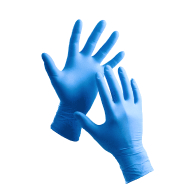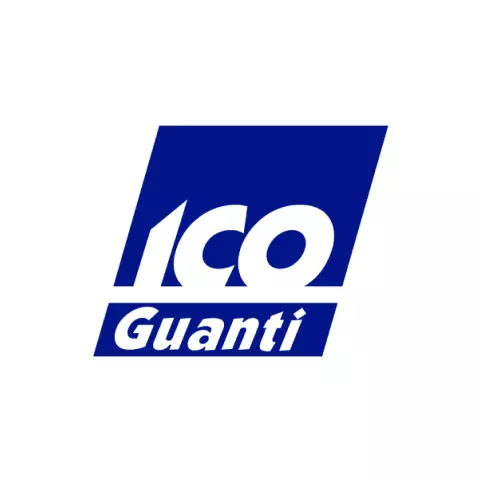Icoguanti PALMPRO 767 Disposable Synthetic Nitrile Glove
Icoguanti
visit storeProduct description
Nitrile blue, powder-free, micro-rough, weight 5.0 g, thickness 0.12 mm. - AQL 1,5 - PPE cat. III - DM - Contact with all food
Offers complete hand coverage, ensuring hygiene and protection. Ideal for various tasks requiring a barrier against contamination and maintaining cleanliness.
Surface is treated for effortless donning and a smooth feel. Reduces tackiness and minimizes latex allergens for enhanced comfort and usability.
Designed for use on either hand, these gloves offer convenience and efficiency. Their symmetrical design simplifies donning and reduces waste.
Offers versatile hand protection for various tasks. Balances durability and flexibility, suitable for diverse applications requiring barrier protection.
Crafted without natural rubber latex, these gloves are ideal for sensitive skin. Provides a comfortable fit for those with latex sensitivities.
Describes whether fingertips have a smooth or textured surface, affecting grip strength, tactile sensitivity, and handling precision for various applications.
Indicates the statistical quality inspection standard measuring defect rates. Lower AQL values (e.g., 0.65) signify fewer defects and higher protection reliability.
Measures from fingertip to cuff end, determining wrist/forearm coverage. Longer gloves provide enhanced protection against splashes and contaminants.
Indicates the composition of the gloves, affecting properties like elasticity, chemical resistance, allergen potential, and suitability for specific tasks.
Indicates the glove's pigmentation, which can aid in color-coding tasks, enhancing visibility, or meeting specific industry requirements for contamination control.
Refers to whether gloves have a smooth or textured finish, affecting grip strength, dexterity, and handling ability in wet or dry conditions.
Indicates whether gloves contain donning powder. Powder-free options reduce allergen risks and contamination, while powdered versions offer easier application.
- Chemical Resistance
- Food Service
- Medical Protection
- Antimicrobial Protection
- Hand Protection
Request a free sample
Test first and buy later. Visit any product page to request your free sample.
Standards and labels
EN ISO 374-1:2016 is a standard that defines the performance requirements for gloves that protect against chemicals and microorganisms. The standard specifies the design, materials, and testing requirements for gloves to protect against chemicals and microorganisms. Possible test results include measurements of the gloves' permeation resistance, degradation, and penetration. It also includes the safety and functionality requirements for gloves.
Test results
Specified Requirements Type BEN 374-5:2016 is a European standard for gloves that protect against microorganisms, specifically gloves that are used for medical and dental procedures. It sets rules for how the gloves should protect against microorganisms and how to test if they meet the standards. Gloves that pass the tests can have a label that says they meet the standard. The test results can be pass or fail for each test that checks the gloves resistance to microorganisms.
Test results
Micro-organisms VirusEN 374-5:2016 is a standard that outlines the requirements and testing methods for protective gloves designed to protect against viruses. The designation 'Virus' indicates that the gloves have passed specific tests confirming their barrier effectiveness against viruses. These tests involve assessing the glove material's resistance to penetration by blood-borne pathogens and other virus-containing fluids, using a bacteriophage as a surrogate virus due to its small size and resistance. Gloves that meet this standard are vital in healthcare settings, laboratories, and any environment where there is a risk of exposure to viral infections. They are crucial for preventing the transmission of diseases, ensuring that workers are protected when handling potentially infectious materials, thus enhancing safety and health protocols in workplaces with biological hazards.
EN 420:2003+A1:2009 is a European standard that sets out the general requirements for hand protection, including comfort, fit, and dexterity. Performance requirements include resistance to abrasion, cut, tear, puncture, and impact. Test results should show the gloves meet these requirements.
MD stands for "Medical Device." It refers to any instruments, apparatus, machines, implants, or other similar or related articles that are intended to be used for human beings for the purpose of diagnosis, prevention, monitoring, treatment or alleviation of disease, injury or disability. In Europe, a MD Label is a special label that must be on all Medical Devices that are sold or used in the European Union (EU). The label must include information about the product, such as the name of the manufacturer, the intended use of the product and CE mark. To be able to sell or use a Medical Device in the EU, the device must meet certain standards and requirements set by the European Union and notified body.
PPE stands for "personal protective equipment." PPE Category 3 refers to equipment that is complex and provide the highest level of protection such as powered respirators, SCBA, and full body suits. In Europe, PPE Category 3 must meet certain safety standards set by the European Union, which means that it must be designed and manufactured to protect the user without causing harm. Companies that make or sell PPE must prove that it meets these standards. They also must have a quality management system in place, have to be audited regularly by a notified body and have to have a technical documentation.
CE Marking is a label that shows a product meets certain safety and environmental standards set by the European Union. To get the CE Marking, a company must test and certify their product meets these standards. CE Marking is required for many products sold in the EU, including electronics, machinery, toys and medical devices. It helps ensure that products are safe for consumers and the environment, and allows for easy trade within the EU.
Food safe refers to the safety of food products that are used or consumed by people. In Europe, food safety is regulated by the European Union (EU) and the European Food Safety Authority (EFSA). These organizations set standards and requirements for food products to ensure they are safe to eat. To be considered "food safe" in Europe, a product must meet these standards and be free of harmful substances. This includes being free of harmful bacteria, pesticides, and other contaminants. Food products that do not meet these standards cannot be sold or used in the EU.
Icoguanti delivery terms
Free delivery for all Icoguanti products
483,23 kr
Price per 10 packages (1 000 pcs)
48,32 kr / 100 pcs
Free delivery
A carton contains 10 packages (1 000 pieces)
Need larger quantities?
Other products you may like
Recently viewed
Need help?
Get help from our experts
Other products you may like
Similar products you may like
Recommended for you
Icoguanti
Delivery time: 8 business days
Orders from 50,00 €
Supplier shipping fee 60,00 €
Free shipping on orders over 1 650,00 €



Find +150,000 products from hundreds of brands
Autonomous sourcing platform
The most efficient way to source and order supplies for your operations
Sourcing
Ordering
List products you’re looking for and we’ll find the best products and prices for you – all for free.
Need help?
Get help from our experts
